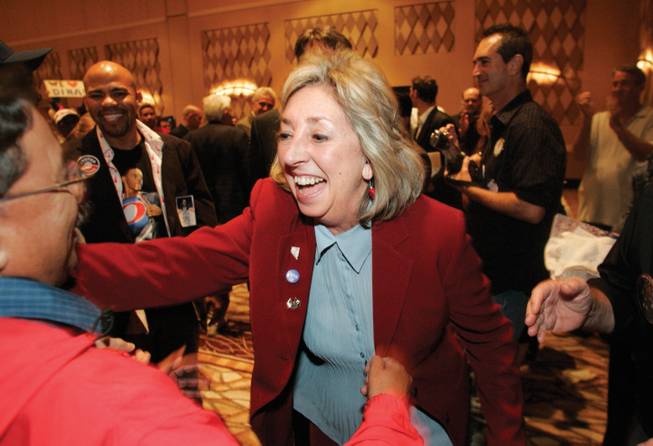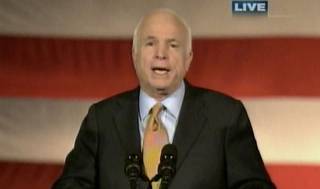
State Sen. and now Congresswoman-elect Dina Titus greets supporters at the Nevada State Democratic Party election night party Tuesday at the Rio.
Wednesday, Nov. 5, 2008 | 2 a.m.
Election Night 2008

Viewing video requires the latest version of Adobe's Flash Player
Republican Watch Party at the Palazzo
The Republican Watch Party Election night at the Palazzo.
Democratic Watch Party at Rio
People attending the Democratic Watch Party awaited results from the presidential election and state congressional races.
Sun Archives
- Fiercely contested race comes to living rooms (10-16-2008)
Beyond the Sun
After Dina Titus lost the 2006 governor’s race to Jim Gibbons, who’d been accused of assaulting a women and other ethical misdeeds, she seemed to have lost some faith in politics.
She had been outspent 2-to-1 and pummeled with negative ads, and despite a Democratic wave across the country, she drew just 44 percent of the vote. She lashed out at rural voters, and her political future seemed uncertain, at best. Fellow Democrats saw her as a divisive figure.
Yet when a Democratic candidate for the Third Congressional District suddenly dropped out of the race this year, Democrats wooed her to take on Rep. Jon Porter.
This time, she ran a careful and disciplined campaign, listened to seasoned advisers and rode the Democratic wave, helped along by ample Democratic money from outside the state.
The campaign wasn’t much, really, and in fact it seems she won far fewer votes than Democratic presidential nominee Sen. Barack Obama. Still, she avoided mistakes and capitalized on the problems that have come to plague the state Republican Party, which was unable to help Porter defend his seat.
Before the race got going, Porter and those close to him knew he was in trouble. Just how much was unclear until last night.
The three-term incumbent’s loss to Titus was foretold this summer, in the thick of the political doldrums. A Republican operative close to Porter’s campaign said the congressman, realizing he was in the toughest fight of his career, had become obsessed with his reelection, micromanaging, sending e-mails and making phone calls in the middle of the night.
The reasons were clear: Democrats, benefiting from their early presidential caucus and the general election campaign of Sen. Barack Obama, had built a 25,000-voter registration edge in the district, one they would eventually increase to nearly 39,400, which would prove insurmountable.
Also, the political environment for Republicans, saddled with an unpopular president and a worsening economy, was growing increasingly toxic across the country. The party’s prospective standard-bearer, Sen. John McCain, had failed to excite the rank and file. His Nevada campaign, which got a late start, proved even less inspiring.
And Porter, the operative said, could hardly look to the Nevada Republican Party for help. After years of political dominance up and down the ticket, the party had lost its organizational edge. Its titular head, Gibbons, was beset with personal problems and terrible approval ratings and couldn’t campaign or raise money; Porter couldn’t be seen with him.
At the same time, state Democrats, working with the Obama campaign, toiled methodically to build their best ground game in modern memory. Part of that was staging well-orchestrated protests outside Porter’s Henderson office. A Republican operative close to Porter, incensed at the lack of Republican response, called a state party staff member to complain. The worker was busy buying a car, he said.
The source also said the state party had frittered away what little money it gained from its early caucus, spending as much as $80 a voter on registration, while continuing to fall farther and farther behind. With the writing on the wall, Porter’s campaign saw little choice but to build its own ground efforts and wage a campaign almost exclusively negative.
Porter made a valiant effort, using a vicious — and often misleading — ad campaign of personal attacks on Titus. He accused her falsely of “double dipping,” or taking a legislative and university salary at the same time. (Titus is a political science professor at UNLV, from which she always taken unpaid leaves of absence.)
But the district seemed to grow more and more disenchanted with Porter, his favorable ratings hovering at 40 percent — dangerous territory for an incumbent.
When Porter considers his three terms in Washington, he will no doubt wonder whether he could have done more for his own district, especially during his first two terms, when he hewed closely to Republican Party orthodoxy in a highly partisan Congress.
Still, Porter’s career isn’t necessarily finished. National Republicans will begin hunting — today — for a candidate to take on U.S. Senate Majority Leader Harry Reid in 2010. Porter is an aggressive fund-raiser and doesn’t mind the attack politics that will be the central feature of any campaign against Reid.
As Titus knows all too well today, two years is a lifetime in politics.


Join the Discussion:
Check this out for a full explanation of our conversion to the LiveFyre commenting system and instructions on how to sign up for an account.
Full comments policy